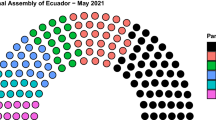Abstract
Riker's size principle for n-person zero-sum games predicts that winning coalitions that form will be minimal in that any player's defection will negate the coalition's winning status. Brams and Fishburn (1995) applied Riker's principle to weighted-majority voting games in which players have voting weights w 1≥w 2≥...≥w n,and a coalition is winning if its members' weights sum to more than half the total weight. We showed that players' bargaining power tends to decrease as their weights decrease when minimal winning coalitions obtain, but that the opposite trend occurs when the minimal winning coalitions that form are “weight-minimal”, referred to as least winning coalitions. In such coalitions, large size may be more harmful than helpful.
The present paper extends and refines our earlier analysis by providing mathematical foundations for minimal and least winning coalitions, developing new data to examine relationships between voting weight and voting power, and applying more sophisticated measures of power to these data. We identify all sets of minimal and least winning coalitions that arise from different voting weights for n≤6 and characterize all coalitions that are minimal winning and least winning for every n. While our new analysis supports our earlier findings, it also indicates there to be less negative correlation between voting weight and voting power when least winning coalitions form. In this context, players' powers are fairly insensitive to their voting weights, so being large or small is not particularly important for inclusion in a least winning coalition.
Similar content being viewed by others
References
Banzhaf JF III (1965) Weighted voting doesn't work: a mathematical analysis. Rutgers Law Rev 19: 317–343
Brams SJ, Fishburn PC (1995) When is size a liability? Bargaining power in minimal winning coalitions. J Theor Politics 7: 301–316
Deegan J Jr, Packel EW (1979) A new index of power for simple n-person games. Int J Game Theory 4: 113–123
Deegan J Jr, Packel EW (1983) To the (minimal winning) victors go the (equally divided) spoils: a new power index for simple n-person games. In: Brams SJ, Lucas WF, Straffin PD Jr (eds) Modules in applied mathematics: political and related models. Springer, New York, pp 239–255
Packel EW, Deegan J Jr (1980) An axiomatized family of power indices for simple n-person games. Public Choice 35: 229–239
Riker WH (1962) The theory of political coalitions. Yale University Press, New Haven, CT
Shapley LS, Shubik M (1954) A method for evaluating the distribution of power in a committee system. Amer Polit Sci Rev 48: 787–792
Author information
Authors and Affiliations
Rights and permissions
About this article
Cite this article
Fishburn, P.C., Brams, S.J. Minimal winning coalitions in weighted-majority voting games. Soc Choice Welfare 13, 397–417 (1996). https://doi.org/10.1007/BF00182851
Received:
Accepted:
Issue Date:
DOI: https://doi.org/10.1007/BF00182851




